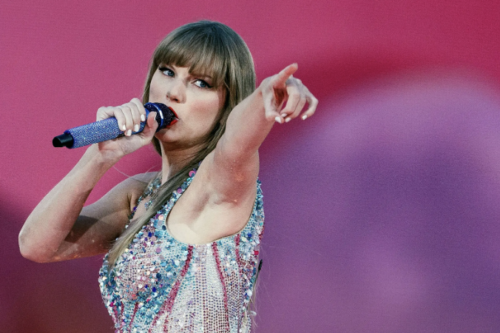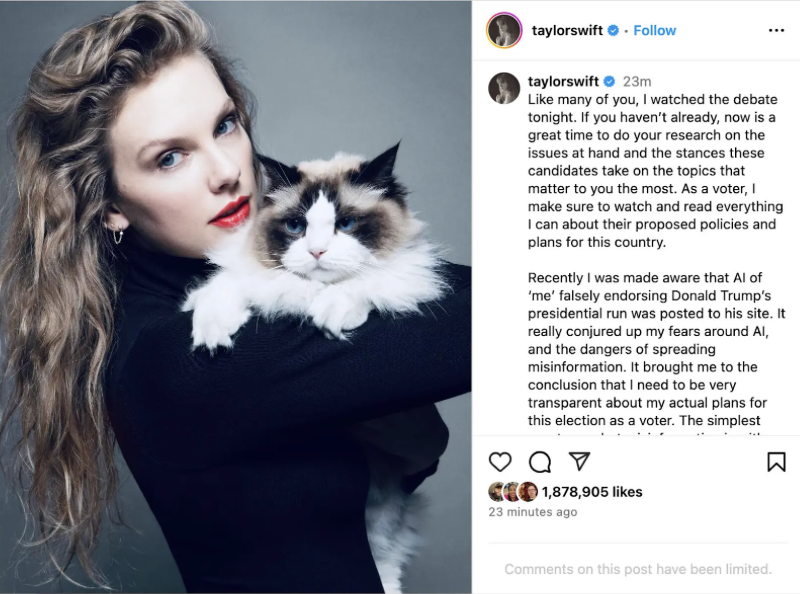Days after President Joe Biden announced that he would not be running for reelection, historians and professors were already speculating which celebrities would endorse Vice President Kamala Harris and when they would do so. The biggest name on everyone’s lips was, of course, Taylor Swift.
In recent years, celebrity endorsements have played a large role in elections. In the 2008 presidential election, Oprah Winfrey’s endorsement of Barack Obama led to a million additional votes.
However, celebrity endorsements of Hillary Clinton in 2016 from Beyonce, LeBron James, Jay-Z and many others were not deal-breakers; she still lost. Additionally, in a poll on YouGov, a mere eight percent of respondents said an endorsement from Swift would make them more likely to support her chosen candidate.
Swift’s public political activism began in 2018 when she supported Democrat Phil Bredesen for the Senate. She criticized his opponent, Marsha Blackburn, for her “voting record in Congress,” explaining, “these are not MY Tennessee values.” Later, Swift endorsed Biden in the 2020 presidential election.
Fans hoped Swift would endorse Harris in 2024 the same way she embraced and endorsed Biden. With the largest fandom in America, democrats anticipated her endorsement might move the needle in one of U.S. history’s closest elections. As the days passed and Swift remained silent, democrats grew anxious. Would Swift’s endorsement be too late?
When Swift finally endorsed Harris following the Sep. 10 presidential debate, she received mixed reactions from the public. Democrats applauded Swift’s “exquisite” timing, which many said added the perfect end to a successful debate.
Taylor Swift posted on Instagram that she supports Kamala Harris because “she fights for the rights and causes I believe need a warrior to champion them.” (Source: Taylor Swift Instagram)
Not all Americans wanted Swift to endorse. In 2020, her endorsement of Biden and Harris sparked outrage among the conservative community that pushed Swift to keep her political beliefs out of her career. Conservatives shared similar sentiments in 2024. Following her endorsement of Harris, Former President Donald Trump wrote on Truth Social, “I HATE TAYLOR SWIFT!”
Many fellow singers felt Swift was out of line for using her platform to promote a candidate. In an interview with the Hollywood Reporter, singer Pharrell Wiliams, known for hits “Happy” and “Get Lucky,” expressed his displeasure with celebrity endorsements. He explained, “I don’t do politics. In fact, I get annoyed sometimes when I see celebrities trying to tell you [who to vote for].”
But music has and always will be, deeply tied to politics. Singer-songwriters like Bob Dylan, Woody Guthrie and John Lennon have used lyricism to discuss social justice issues. It is impossible for an artist to be completely apolitical.
Celebrities like Swift often find themselves in a limbo of people who push them to share their political positions and those who relentlessly harass them once they do. The push and pull creates a double standard that disproportionately affects women. Male celebrities often receive little to no criticism for posting controversial political opinions while their female counterparts receive intense backlash. With the competing standards surrounding celebrities’ political opinions, countless artists have succumbed to the pressure.
In September, singer Chappell Roan said in an interview with The Guardian that she would not endorse a candidate due to “problems on both sides.” Many fans and LGBTQ+ activists criticized her for the way her comment supported “both sides,” arguing that her neutrality was a “privilege.”
Roan later released a TikTok clarifying her position. “Obviously, f— the policies of the right, but also f— some of the policies on the left,” said Roan. “That’s why I can’t endorse. That’s why I can’t, like, put my entire name in my entire project behind one.”
The backlash eventually caused Roan to cancel her set at the “All Things Go” festivals in NYC and Washington D.C.
Swift, Roan and all other celebrities should not be forced to share their political positions, nor should they be harassed for them. Although public figures may seem larger than life, celebrities are humans and citizens. As such, they have the right to free speech. It is well within the power of a singer to use their platform to share the candidate they will be voting for.
Just because celebrities should feel free to share their political opinions does not mean that their beliefs should have more weight than any other person’s. Singers should not be treated like political saviors who can change an election with an Instagram post. It is delusional, and even insulting, to believe that some voters value what their favorite singer thinks over issues like personal freedom, immigration policies and gun violence that will be decided this November.







